- Home
- Tom Stoppard
Tom Stoppard Plays 3 Page 8
Tom Stoppard Plays 3 Read online
Page 8
BOY: He wishes you to pay a debt?
PHILO: Yes.
BOY: But you do not wish to pay it?
PHILO: If it can be avoided. I do not owe it. Do you see?
BOY: Of course. Will you buy me a gun?
PHILO: What do you want a gun for? This is not cowboys. (He picks up the monkey.) Oh no, it is not cowboys.
29. INT. HOTEL ROOM. IN THE TOWN. DAY
Laurel’s and Hardy’s room.
LAUREL lies on his back on one of the twin beds. HARDY paces up and down.
LAUREL: Books. The library.
HARDY: For me it’s still the monkey. For ten years in Moscow he keeps a monkey. Maybe the monkey is the only friend he trusted, a man in his position. Now he is alone somewhere. I see him with a monkey. We’ll try the pets’ doctor again. Show him the photo.
LAUREL: Now you show him the photo … (He laughs shortly.)
HARDY: Who would expect two people with monkeys in a place like this?
LAUREL: Not me. A monkey is a risk for him. ‘Look at that man, he has a monkey’ … no.
HARDY: After a while a man takes risks. Two years now. He thinks he is well hidden. Maybe even forgotten. He needs a friend who asks no questions. I think we visit the animal doctor.
LAUREL: No, the animal nurse. You spoiled the doctor. Next time if he has any more friends with monkeys he will say nothing and then telephone.
30. EXT. VILLAGE. DAY
ACHERSON and CAROL walk into the village. They are objects of great curiosity. It is not the kind of village which is used to tourists. VILLAGERS, mainly children and old people, emerge and watch them.
31. INT. PHILO’S ROOM. SAME TIME
PHILO sees this from the window. ACHERSON starts talking to one of the VILLAGERS.
The BOY enters the room urgently.
PHILO: Yes – I see them. I don’t like this walking.
(Cutaway to ACHERSON.)
ACHERSON: It’s very simple. I want – to buy – money – look, I have money – I want to buy petrol. Auto er no go, halt.
(Nobody understands him. BORIS shows up and gestures ACHERSON and CAROL to enter the bar.
Finish cutaway.)
BOY: Tourists. English.
PHILO: Yes. I suppose so.
BOY: My father is bringing them. What shall I do‚ Captain?
PHILO: Nothing. Yes – take Mimi. In your room.
(He gives the BOY the monkey, and the BOY goes out. PHILO takes a big drink‚ pouring from a bottle into a dirty glass. There is a knock on the door, and BORIS shows in ACHERSON and CAROL, with a flourish.)
BORIS: Anglitch!
ACHERSON: I say, do you speak English?
PHILO: Yes.
ACHERSON: Thank the Lord for that. We’ve run out of petrol, about a mile down the road, if you can call it a road.
PHILO: You were coming here?
ACHERSON: No. Well, we weren’t going anywhere in particular. Just having an afternoon off … a bit of a tour … the views, and all that.
PHILO: An afternoon off?
ACHERSON: We’re in Montebianca, for the week; business and pleasure, sales and marketing – last year was Majorca, frightful place, but it gets you away –
CAROL: Charles …
ACHERSON: Oh yes – getting off the point. My name’s Acherson … My wife, Carol.
CAROL: How do you do? – We’d be awfully grateful if you …
PHILO: You ran out of petrol just from Montebianca?
ACHERSON: We hired the car there, paid for it to be topped up – they’re all such thieves. They took me for just another stupid tourist. Well, they won’t get away with it. I’ve got connections at the Consulate. Look – is there any petrol in the village?
PHILO: No, no cars, no tractors. The fields are too rocky, they use horses.
(He speaks briefly to BORIS, who replies.) Yes, there’s a pump four miles back where you turned off the main road. He’ll send someone to get a can for you.
ACHERSON: Thank you. Can you tell him we’ll pay for the trouble.
PHILO: He knows that.
(BORIS leaves the roam.)
ACHERSON: Well, we mustn’t impose on you.
CAROL: No. Is there a bathroom? – I could do with a bit of a …
PHILO: (Suddenly deciding to accept them) There’s clean water in the jug. Please avail yourself. The towel’s clean, too – you’re lucky; I count the weeks by clean towels.
ACHERSON: Have you been here long?
PHILO: Yes.
ACHERSON: Well, the simple life. I must say I quite envy you.
CAROL: (Pouring water) At the hotel he made a fuss because the claret wasn’t château-bottled.
ACHERSON: Well, one must draw the line…. You’re not English, are you?
PHILO: No.
ACHERSON: It’s our first time here. Always been curious to see the place. Beautiful country, charming people –
CAROL: He can’t stand it –
ACHERSON: Now hold on, Carol …
PHILO: I can’t stand it either.
ACHERSON: Frightful hole, isn’t it? Why don’t you leave?
PHILO: I have a problem with papers.
ACHERSON: Oh yes … they’re very keen on papers. Well –
(He turns to CAROL, who is drying her hands.)
PHILO: Did you find soap?
CAROL: Yes, thank you. Where should I empty the water?
PHILO: It’s all right.
CAROL: Well, thank you.
ACHERSON: We’ll be in the bar. Might see you there. Perhaps we could buy you a drink before the fellow comes back with the petrol.
PHILO: Yes. Thank you. I usually have a glass or two around this time.
ACHERSON: Fine.
(PHILO closes the door after them, and sits down on the bed. He laughs to himself‚ at himself, and has a drink on himself.)
32. EXT. MONTEBIANCA TOWN. SHOPS CLOSING. LATE AFTERNOON
LAUREL and HARDY are watching the vet’s door. One or two cars are parked around there. LAUREL, bored, is glancing at the guidebook. He starts to laugh.
LAUREL: Hey‚ it mentions you. The views are unexampled by the largest traveller.
(HARDY glowers at him.
Up the road, the NURSE comes out of the vet’s. She walks away from them, and they start to move. But after three paces she stops and gets into the front passenger seat of a waiting car. LAUREL and HARDY look round helplessly but this is not a taxi-laden place. The NURSE is seen to kiss the BOYFRIEND as the car moves. HARDY throws his hat on the ground.)
33. INT. VILLAGE BAR. LATE AFTERNOON
BORIS behind the bar. Some LOCALS. PHILO, ACHERSON and CAROL share a table and a bottle. The BOY enters, carrying a two-gallon can with some difficulty. He stops when he sees the three of them together.
PHILO: Here! – S’okay.
(It is apparent that PHILO is looser through drink. The BOY sees now that CAROL is holding Mimi the monkey.)
They are friends. (To CAROL.) Here is my other friend – in fact he is my scout.
CAROL: He’s a scout?
(The BOY smiles but is disappointed by PHILO. ACHERSON gives the BOY money, which the BOY gives to BORIS. PHILO explains this –)
PHILO: His father.
ACHERSON: Oh. Well, are you ready, Carol?
CAROL: I’ll wait for you here, darling. You’ll be back in half an hour.
ACHERSON: Well, come for the walk.
CAROL: No, I’ve walked enough. You’ve got to drive past this way so you might as well pick me up.
(He’s not sure about it.)
Honestly, I’ll be perfectly all right.
ACHERSON: Fine. Well, see you both later.
CAROL: Bye-bye, darling.
(CAROL gives Mimi to PHILO and gets up to see ACHERSON to the door. ACHERSON goes. Mimi sits on PHILO’s shoulder. PHILO pours a drink.
There is a flash. CAROL has taken his picture. The camera was in her shoulder bag.)
PHILO: (Sharply) What are you doing?
(Everybody in the bar looks at CAROL.)
I like to take pictures. Is it all right?
PHILO: (Subsiding) Yes … of course.
CAROL: I’d like to take some in the village.
PHILO: Yes. Why not?
34. EXT. THE CHURCH. LATE AFTERNOON
A wedding is taking place.
A BRIDE and GROOM and wedding guests come out of the church with much gaiety.
CAROL takes a picture.
CAROL moves around the village looking for and finding picturesque subjects. She is watched by not particularly friendly faces of women. CAROL see PHILO watching her from his upstairs window. She waves at him cheerfully. She raises the camera to her eye, but through the lens she sees his window empty.
The shadows lengthen.
35. EXT. ROAD. SAME TIME
ACHERSON walks along the road. There is no one in sight. Then ACHERSON gets the feeling he is being watched. He looks around. Perhaps he hears a sound. The surroundings begin to look sinister to him. He hurries on towards the car. Then he definitely sees something move, off the road, behind rocks. He puts the can down quietly and moves off the road and waits. After a moment he moves aside quietly and then changes direction back towards the road. Ahead of him, his back to ACHERSON, the BOY reveals himself.
ACHERSON: (Relieved) Hey! – You scouting?
(The BOY looks at him, embarrassed.)
Come on, then.
(The car is only yards away. ACHERSON gets the can. The boy takes the cap off the tank, and ACHERSON pours the petrol. When the can is empty, ACHERSON puts it into the car. The BOY screws the cap on the tank.
There is the sound of petrol trickling. ACHERSON sees petrol on the road and realizes the tank is holed.
The BOY is paying no attention. On the back window-ledge of the car, among boxes and odds and ends, he sees part of a rifle.)
36. INT. VILLAGE BAR. LATE AFTERNOON
PHILO, without Mimi, is drinking. CAROL comes in and puts the camera on the table in front of him.
CAROL: Hello.
PHILO: Mrs … I’ve forgotten your name.
CAROL: Acherson.
PHILO: Mrs Acherson … It’s very nice for me that you ran out of petrol. I don’t see many people …
CAROL: You didn’t seem very pleased at first.
PHILO: I didn’t know who you were … You could have been … anybody.
CAROL: Well we were. (She smiles at him.)
PHILO: What does your husband do?
CAROL: He’s a sales executive.
PHILO: What does that mean? A salesman?
CAROL: I suppose so. He never discusses work at home. I suppose he’s just a salesman.
PHILO: He said he had connections. At the Consulate.
CAROL: Oh that. A school friend. Charles was just bad-tempered about the car. He isn’t frightfully good about Abroad. Last year the Spaniards were dirty, the year before the French were grasping and the year before that the Italians were impertinent. Now the Montebiancans are all thieves – oh‚ I say, you’re not –?
PHILO: No, I’m not.
CAROL: Well, what are you?
PHILO: We’re not on the maps any more. The Russians, you know … They saved us in the war, that’s how it started, and now they have saved us out of existence. I’d like to go back while my own language is still being spoken. But I can’t leave here.
CAROL: Did you choose to come?
PHILO: Choose? I don’t know. It’s neutral ground. They let me in and they let me stay.
CAROL: What do you do?
PHILO: Drink. I have some savings, in the bank in town. I write Boris a cheque once a month.
CAROL: And when the money’s gone?
PHILO: When the money’s gone I’ll be dead, if I time it right. What does your husband sell?
CAROL: Toys.
(This naturally brings PHILO up short.)
PHILO: Toys?
CAROL: Yes, that’s right. Toytown International. He’s on the export side.
(PHILO stares at her.)
37. MIX TO REPRISE, SCENE 9
Telephone: Toytown International.
PHILO: Toytown? Thank you. I want the Sales Director in charge of train sets.
(SANDERS cuts off the call.)
SANDERS: I’m out.
(OTIS joins him in the frame.)
This is Mr Otis of Model Aeroplanes. He’s taken over Exports.
OTIS: Welcome to Vienna, Mr Marin.
SANDERS: Mr Otis is an American. I’m afraid.
OTIS: I’m attached to London. Just happened to be visiting. Kind of lucky.
38. EXT. VIENNA STATION. SAME TIME
PHILO, SANDERS and OTIS walk out of the station and into a waiting car‚ all three men getting into the back.
39. INT. CAR. SAME TIME
The car moves off through the city.
SANDERS: My name is Sanders. A friend of a friend called from the frontier. Pity about the trouble. Who was it?
PHILO: An American salesman. Comisky, I think. Poor man.
They killed my monkey, too.
OTIS: Your monkey, Mr Marin?
PHILO: I couldn’t leave Nana behind – I’d had her for years.
OTIS: That’s an exotic sort of pet, Mr Marin. You must have felt pretty secure.
PHILO: Why not?
OTIS: But at the frontier …
PHILO: I don’t understand it.
SANDERS: They must have known you were doing a bunk. They were waiting for you.
PHILO: I don’t know – I’ve been thinking, perhaps it was Comisky they wanted – perhaps he was – somebody in the game – a bizarre coincidence …
OTIS: (Coldly) They were waiting for you. Think about it, Marin. Just stay quiet and think about it.
PHILO: (To SANDERS) Who is this man? I want to see Brigadier Payne in London. I work for him. And him I trust.
SANDERS: He’s Major-General Payne, Retired. Retired to his club, where he reads The Times through a magnifying glass, I’m told. The old soldiers have gone, and the professionals are in charge.
OTIS: You’ve been away a long time, Marin, and for the last four years you’ve been working for me. And at the moment I don’t even know if you are who you are supposed to be, because you’re supposed to be dead, you and your monkey.
(The car stops outside an old nondescript building.)
40. EXT. CAR. SAME TIME
The three of them get out of the car and enter the building. Outside the main door there is a brass plate: Toytown International.
41. INT. TOYTOWN OFFICE. DAY
A simple room. Sanders’s office.
SANDERS sits behind the desk. PHILO stands. OTIS is not there.
PHILO: You take your orders from an American?
SANDERS: I wouldn’t put it like that. It’s liaison, common interest. There’s been a merger. None of us likes it. Otis reports to a committee of three, one of whom is a German. Funny old world. I can tell you that because the German’s mistress ran off to Moscow with the Naval Attaché. But I suppose you’d heard.
PHILO: No, I hadn’t. Brigadier Payne was kicked out?
SANDERS: Decent sort, Payne. Trouble was he bumped off a couple of Washington’s lads in East Berlin – the Americans’ own fault, in my view, since they never told us what they were about, but the result was this idiotic combined ops, and I have to take orders from Otis. Though I wouldn’t put it like that. He’s top man for the toy factory now as far as Clearance goes. I’m told he’s decent sort when you get to know him, but no one ever has, so his decency is a sort of secret.
PHILO: Have you got a drink in here?
SANDERS: Heavens, no.
PHILO: Well, what happens now?
SANDERS: What did you want?
PHILO: I want to go back to England.
SANDERS: To the office?
PHILO: I don’t know.
SANDERS: Nor me. It’s not like it was with Payne.
P
HILO: I had a right to leave, Sanders.
SANDERS: You were working for us.
PHILO: I’m not a British agent. I don’t belong to anybody.
(OTIS enters, carrying a file.)
I don’t owe you people a thing.
OTIS: An explanation, Philo.
PHILO: Oh – so I’m not dead?
OTIS: Your prints came through for you. (He tosses a fingerprint card on the desk.) Well, now. What brings you to Vienna?
PHILO: (Shrugs) You had a friend inside. One day he had enough.
OTIS: Why?
PHILO: That would take a lot of explaining.
OTIS: Well, I’d like to take your explanation back to London, and I’m leaving tonight.
PHILO: Without me?
OTIS: That depends. Why did you have enough?
PHILO: Look, I wasn’t in it for your country. I had my own.
OTIS: Common interest.
PHILO: That may have been so in the old days. Now my country doesn’t even show on your maps. The tanks have been followed by the map-makers, and in the schools the children are only taught Russian. I wasn’t doing any good in there. I was doing more before.
OTIS: (Angrily) What – with that sad little group of émigrés keeping the flag flying from a maisonette in Notting Hill? That’s where Payne took you from, Marin, and it’s a lot sadder now with their photographs of dead generals and their middle-aged amateurs getting picked up in Leningrad with their coat linings stuffed with leaflets. Leaflets! Don’t tell me you came back for that?
PHILO: No.
OTIS: What, then?
PHILO: Listen, Otis. They’ve got away with it. My war is lost. It was probably lost before I joined it. And I’m tired of fighting in yours.
OTIS: That’s why you got out?
PHILO: Yes.
OTIS: Just like that? Catch a train in Moscow, change here and there, across borders, everything smooth, no questions, all the way to the frontier. And then they shoot the wrong man.
PHILO: That’s right.

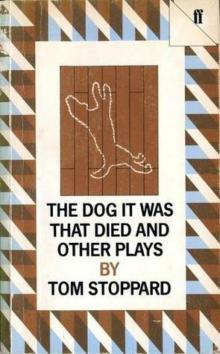 The Dog It Was That Died and Other Plays
The Dog It Was That Died and Other Plays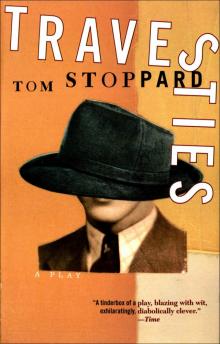 Travesties
Travesties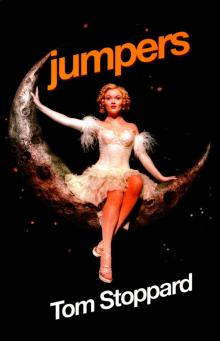 Jumpers
Jumpers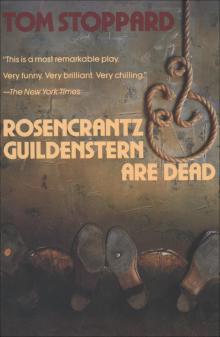 Rosencrantz and Guildenstern Are Dead
Rosencrantz and Guildenstern Are Dead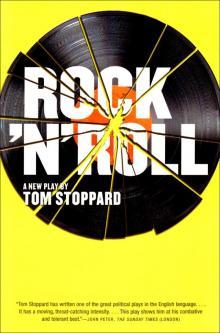 Rock 'N' Roll
Rock 'N' Roll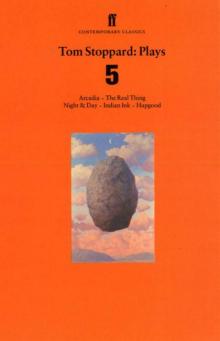 Plays 5
Plays 5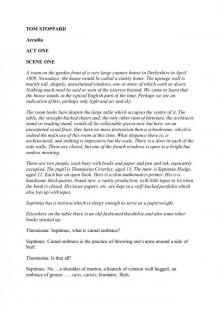 Arcadia
Arcadia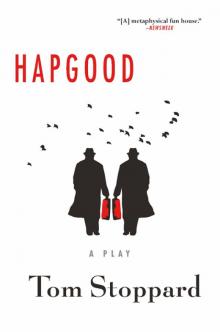 Hapgood
Hapgood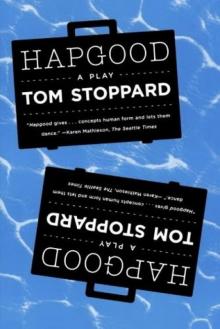 Hapgood: A Play
Hapgood: A Play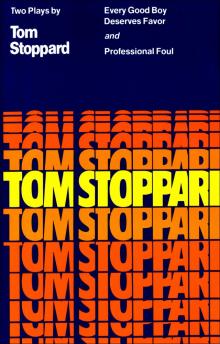 Every Good Boy Deserves Favor & Professional Foul
Every Good Boy Deserves Favor & Professional Foul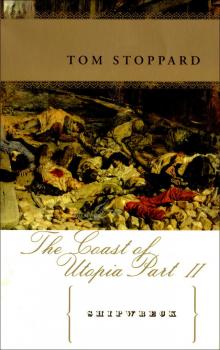 The Coast of Utopia: Voyage, Shipwreck, Salvage
The Coast of Utopia: Voyage, Shipwreck, Salvage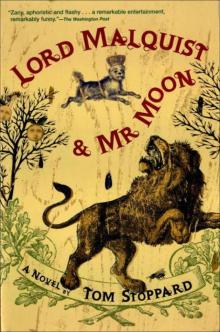 Lord Malquist & Mr. Moon
Lord Malquist & Mr. Moon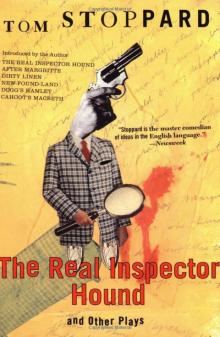 The Real Inspector Hound and Other Plays
The Real Inspector Hound and Other Plays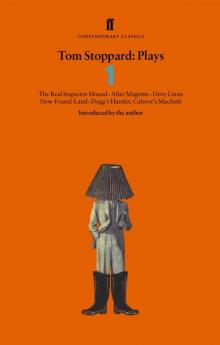 Tom Stoppard Plays 1
Tom Stoppard Plays 1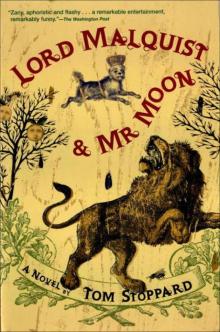 Lord Malquist & Mr. Moon: A Novel
Lord Malquist & Mr. Moon: A Novel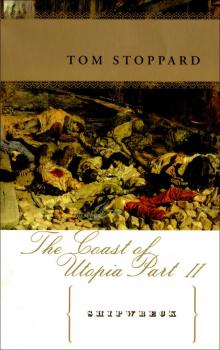 Shipwreck
Shipwreck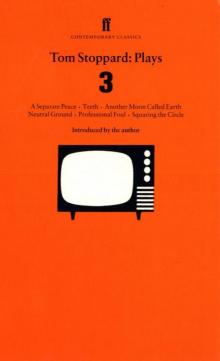 Tom Stoppard Plays 3
Tom Stoppard Plays 3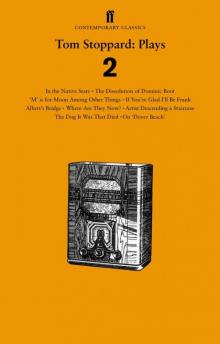 Tom Stoppard Plays 2
Tom Stoppard Plays 2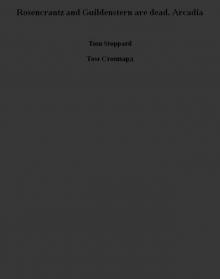 Rosencrantz and Guildenstern are dead. Arcadia
Rosencrantz and Guildenstern are dead. Arcadia